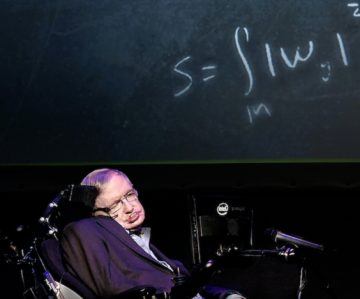Philip Ball in Prospect:
 In one of his 2016 Reith Lectures, Stephen Hawking said an odd thing. “People have searched for mini black holes… but have so far not found any,” he intoned with his trademark voice synthesiser. “This is a pity, because if they had I would have got a Nobel Prize.” The audience at the Royal Institution in London (which included me) laughed. But I was struck by how unusual it was for a scientist to state publicly that their work warranted a Nobel. It was no passing comment. A few minutes later, Hawking described how mini black holes—which he predicted in the early 1970s—might yet be seen in the Large Hadron Collider (LHC) at CERN in Geneva. “So I might get a Nobel Prize after all,” he added, to more laughter.
In one of his 2016 Reith Lectures, Stephen Hawking said an odd thing. “People have searched for mini black holes… but have so far not found any,” he intoned with his trademark voice synthesiser. “This is a pity, because if they had I would have got a Nobel Prize.” The audience at the Royal Institution in London (which included me) laughed. But I was struck by how unusual it was for a scientist to state publicly that their work warranted a Nobel. It was no passing comment. A few minutes later, Hawking described how mini black holes—which he predicted in the early 1970s—might yet be seen in the Large Hadron Collider (LHC) at CERN in Geneva. “So I might get a Nobel Prize after all,” he added, to more laughter.
Most doubtless saw this as an example of Hawking’s famous wit. But in truth it gives a clue to the physicist’s elusive character: shamelessly self-promoting to the point of arrogance, and heedless of what others might think.
Veteran science writer Charles Seife’s warts-and-all biography doesn’t hold back from exploring Hawking’s less appealing sides. This is long overdue—not so much because Hawking needs cutting down to size, but because he needs to be rehumanised.
More here.
